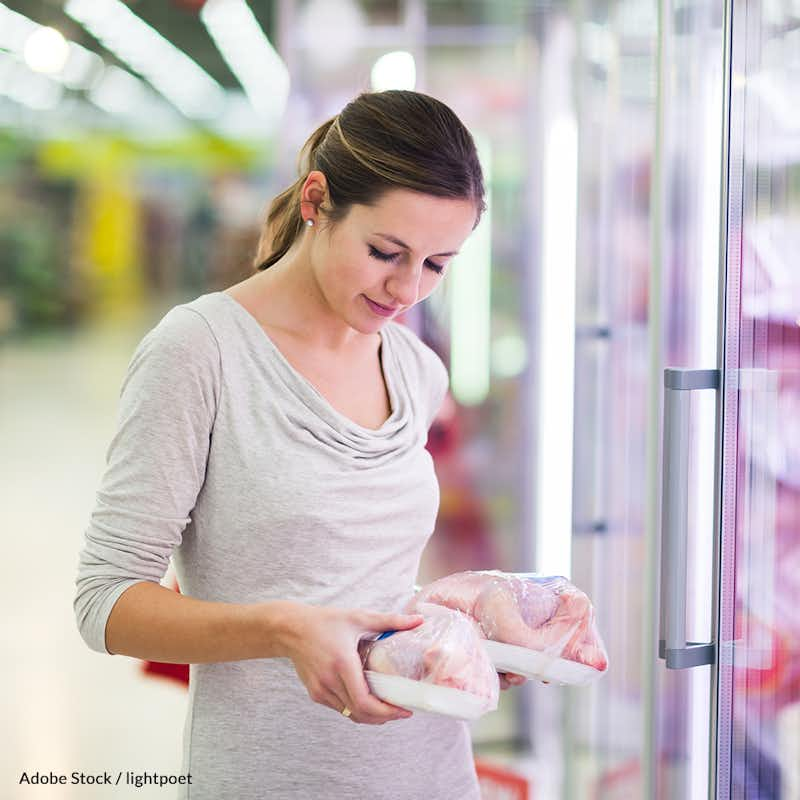Humanewashing Hurts Animals
26,663 signatures toward our 50,000 Goal
Sponsor: The Animal Rescue Site
We need standards to prevent companies from profiting off vague and misleading advertising statements like "Certified Humane."

Humane labels signal to consumers that such products were produced in compliance with high welfare standards and that the animals involved in the production process were treated humanely; that during each phase of a farmed animal's life, they were shown compassion over cruelty, even when it means opting for alternative industrial practices.1.
In most cases, this is patently false.
It's not uncommon to see refrigerated packages of store-brand turkey and chicken bearing stickers marked with humane labeling at many supermarkets, suggesting to shoppers that the birds had been treated better than conventional farm animals2.
Animals slaughtered for these products still spend their entire lives on a farm—and may have never experienced a day outside a cage.
A report from the anti-factory farming group Farm Forward shows that companies use humanewashing to deceive consumers who care about animal rights, leading them to believe animals were raised according to their expectations of humane treatment even when they were not3. They play on the familiarity of terms like "all natural" and "free-range" by using certification schemes to formalize their own empty standards.
When companies misrepresent the way they raise and treat animals, it deprives consumers of the ability to drive the marketplace through informed purchasing decisions, and disadvantages competitors of more humanely produced food. This tricks conscientious consumers by hiding the factory farming origins of their meat, dairy, and eggs. It keeps more animals suffering in these facilities to meet the fraudulently inflated consumer demand4.
Rather than fight to prove their chicken coops offered any sense of "humane" comfort, Perdue, the third-largest chicken company in the country, and Kroger, the largest grocer in the country, both settled class-action lawsuits resulting in agreements to remove the word "humane" in reference to how their chickens are raised for their Harvestland (Perdue) and Simple Truth (Kroger) brands5.
There are rarely such win-win-win scenarios for producers, consumers, and animals alike. Humanewashing at best offers vague, unregulated, and unenforced statements with no meaningful content or oversight and welfare standards that do not (significantly) go beyond reiterations of the legally required minimum or reflections of standard agricultural practices6.
They are misleading and primarily amount to a marketing strategy that enable consumers to buy a clean conscience.
Sign the petition below and tell the USDA's Food Safety and Inspection Service (FSIS) to implement clear and standardized guidelines for advertising humane processes on food products.
- Animal Welfare Institute (2020), "Farm Animals."
- Lisa Held, Civil Eats (19 January 2021), "Are Some Animal Welfare Labels 'Humanewashing'?."
- Andrew Decoriolis, Farm Forward (30 December 2020), "Farm Forward Report Exposes the Dirt on Humanewashing."
- Animal Legal Defense Fund, "How False Advertising Lawsuits Help Animals."
- Leah Garcés, Food Safety News (27 October 2014), "Consumer Marketing Win: Ending 'Humanewashing'."
- Saskia Stucki, Symposium on Global Animal Law (2017) "(Certified) Humane Violence? Animal Welfare Labels, The Ambivalence Of Humanizing The Inhumane, And What International Humanitarian Law Has To Do With It."
The Petition:
To the USDA's Food Safety and Inspection Service (FSIS),
Vague and misleading statements that claim certain products have been produced in a way "more humane" than others are not only confusing to consumers, but harmful to animals. It's been called "humanewashing" but it's nothing more than false advertising, plain and simple.
Labels like "Certified Humane," "Cage Free," or "Free Range" lead consumers to believe that the products were produced in compliance with high welfare standards and that the animals involved in the production process were treated humanely; that in each phase of a farmed animal's life, compassion was chosen over cruelty, even when it means opting for alternative industrial practices.
Rather than fight to prove their chicken coops offered any sense of "humane" comfort, Perdue, the third-largest chicken company in the country, and Kroger, the largest grocer in the country, both settled class-action lawsuits resulting in agreements to remove the word "humane" in reference to how their chickens are raised for their Harvestland (Perdue) and Simple Truth (Kroger) brands. Whole Foods now faces similar outrage linked to its usage of GAP's "Animal Welfare Certified" labels.
These statements are unregulated and unenforced, with no meaningful content or oversight and welfare standards that do not (significantly) go beyond reiterations of the legally required minimum or reflections of standard agricultural practices.
Humanewashing is nothing more than a marketing strategy that enables consumers to buy a clean conscience. In reality, it's the animals that are paying the real price.
I demand you enact clear and standardized guidelines for advertising humane processes on food products.
Sincerely,